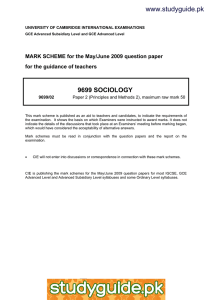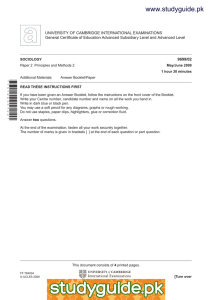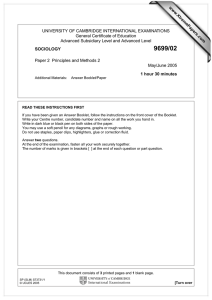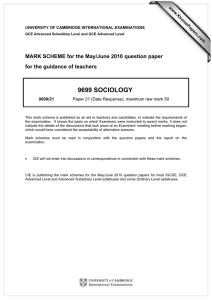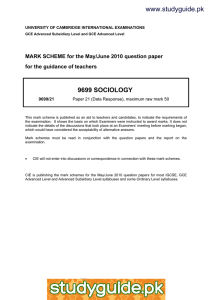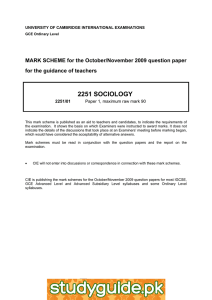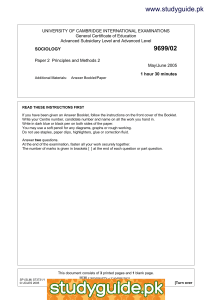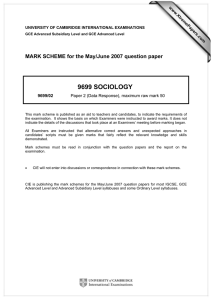9699 SOCIOLOGY MARK SCHEME for the May/June 2009 question paper
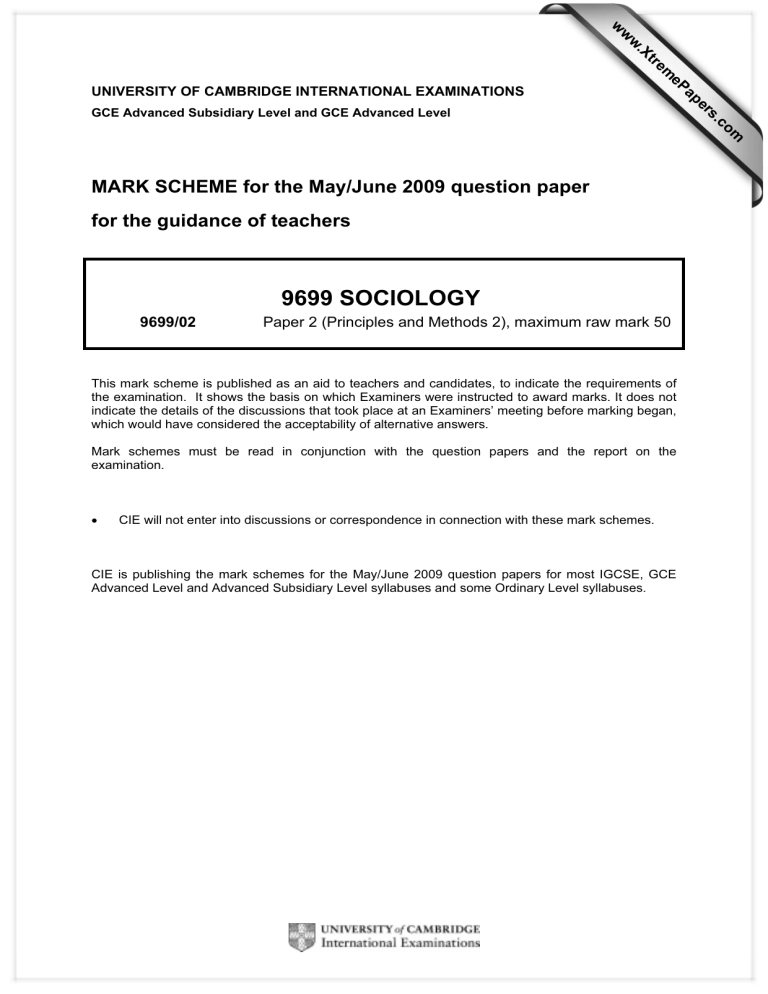
www.XtremePapers.com
UNIVERSITY OF CAMBRIDGE INTERNATIONAL EXAMINATIONS
GCE Advanced Subsidiary Level and GCE Advanced Level
MARK SCHEME for the May/June 2009 question paper for the guidance of teachers
9699/02
9699 SOCIOLOGY
Paper 2 (Principles and Methods 2), maximum raw mark 50
This mark scheme is published as an aid to teachers and candidates, to indicate the requirements of the examination. It shows the basis on which Examiners were instructed to award marks. It does not indicate the details of the discussions that took place at an Examiners’ meeting before marking began, which would have considered the acceptability of alternative answers.
Mark schemes must be read in conjunction with the question papers and the report on the examination.
• CIE will not enter into discussions or correspondence in connection with these mark schemes.
CIE is publishing the mark schemes for the May/June 2009 question papers for most IGCSE, GCE
Advanced Level and Advanced Subsidiary Level syllabuses and some Ordinary Level syllabuses.
Page 2 Mark Scheme: Teachers’ version Syllabus Paper
GCE A/AS LEVEL – May/June 2009 9699 02
1 Social order is possible because each individual member of society plays specific roles.
Each role carries a status and a set of expectations about how the person performing the role will behave. These expectations reflect the values and beliefs that form the culture of the society.
It is mainly through interaction with other people that the individual learns the expectations associated with his or her roles. This process is known as socialisation.
Through socialisation people learn that social sanctions exist to encourage behaviour appropriate to their roles and to discourage inappropriate behaviour. These sanctions may be negative or positive.
Among sociologists there are different views about what is meant by socialisation and how this process takes place. Functionalists view socialisation as a one-way process in which society, through agencies such as the family, the education system and peer groups, ensures that individuals perform the roles already defined for them by those agencies. However, this view has been criticised for implying an 'over-socialised' concept of the relationship between the individual and society. Interactionists argue, for example, that socialisation is not a one-way process because people are free to negotiate their social roles and obligations.
(a) What is meant by the term status ? [2]
Status refers to the social honour or prestige that is acquired through occupying a particular position in the social structure e.g. teacher, doctor. Two marks for a clear and accurate definition; one mark for a partial definition, such as 'the position a person has in society'.
Describe examples of sanctions that might be used to discourage inappropriate behaviour. [4]
Examples of formal or informal social control might be used here. One mark for the example plus one mark for development (2 × 2 marks).
(c) Explain how social order is maintained in a closed institution, such as a mental asylum or a prison. [8]
0–4 Answers at this level will discuss social order in general without relating the material directly to closed institutions. A couple of good points about how social order is maintained in general would trigger the top part of the band.
5–8 A fuller account of how social order is maintained with only weak links to closed institutions would fit the lower part of the band. The discussion might focus on factors such as socialisation, punishments, rewards, ideology, and peer group pressure.
A better response would discuss the mechanisms of social control within the context of closed institutions specifically. This might include references to classic studies such as those by Goffman and Foucault. Processes such as stigmatisation, surveillance, labelling, status manipulation, medicalisation, and confinement would be relevant to discuss in answers of high quality.
© UCLES 2009
Page 3 Mark Scheme: Teachers’ version Syllabus Paper
GCE A/AS LEVEL – May/June 2009
(d) Assess the functionalist theory of socialisation.
9699 02
[11]
0–4 Answers at this level are likely to show only limited understanding of the functionalist theory of socialisation. A few simple remarks about functionalism in general might be worth 2 or 3 marks. A basic account of what the process of socialisation involves that might to some extent be linked to functionalist theory would trigger the top of the band.
5–8 A sound descriptive account of the functionalist theory of socialisation with no further development would fit the lower part of the band. If the material on the functionalist theory is complemented by an account of how socialisation is viewed in at least one other sociological perspective, most likely interactionism, the top of the band would be triggered. Explicit assessment of the functionalist theory is not essential to reach the top of this band.
9–11 At the this level, a good account of the functionalist theory of socialisation will be accompanied by an assessment of the strengths and limitations of that theory. Lower in the band, a good part of the assessment may be in the form of juxtaposition through, for example, contrasting the functionalist and interactionist views on socialisation.
The analysis will be more explicit and conceptually sophisticated at the top of the band.
2 In sociological research there is a distinction between primary data and secondary data.
Information that is collected by the sociologist through his or her own original research is known as primary data. Secondary data refers to information that already exists, and which sociologists can analyse or re-analyse with their own concepts and models in mind.
Any data used for sociological purposes, whether derived from primary or secondary sources, can also be described as quantitative or qualitative in form. Quantitative data is usually presented in numeric form and derives from large-scale survey methods.
Qualitative data deals directly with people's experiences, as well as their feelings about, and interpretations of, the situations in which they find themselves.
Sociologists working within the positivist tradition often use quantitative data because of its numeric form, allowing trends, patterns and correlations to be identified. By contrast, sociologists working within the interactionist tradition have questioned the value of quantitative data. They see greater validity in qualitative data, allowing them a deeper understanding of the small groups and individuals they study.
(a) What is meant by the term validity in sociological research? [2]
Validity concerns whether a research method gives a true picture of what it claims to have recorded and depicts social reality accurately. Two marks for a clear and accurate definition; one mark for a partial definition.
Describe examples of secondary data. [4]
Examples of secondary data include: official statistics, historical documents, broadcast materials, newspapers and magazines, diaries, the work of other researchers, etc. One mark for the example plus one mark for development (2 × 2 marks).
© UCLES 2009
Page 4 Mark Scheme: Teachers’ version Syllabus Paper
GCE A/AS LEVEL – May/June 2009 9699
(c) Explain why interactionists have questioned the value of quantitative data.
02
[8]
0–4 A few simple points about quantitative data with no direct reference to the interactionist critique might be worth 1 or 2 marks. An account of the interactionist perspective on research methods with no explicit links to the possible limitations of quantitative date, could reach the top of the band if done reasonably well.
5–8 A solid account of the possible limitations of using quantitative data in sociological research, with links to the interactionist perspective somewhat implicit or partial, would fit the lower part of the band. To go higher, the links between the critique of quantitative data and the interactionist perspective need to be explicit and well informed.
(d) Assess the usefulness of secondary data in sociological research. [11]
0–4 A simple account of what constitutes secondary data would be worth 1 or 2 marks.
A thin statement of one or two benefits and/or limitations of using secondary data would trigger the top of the band.
5–8 An answer that is confined to a solid account of the strengths and/or limitations of just one type of secondary data, say official statistics, would merit 5 or 6 marks. An answer that covers the particular strengths and/or limitations of several types of secondary data would trigger the top of the band. At this level, therefore, there need be no attempt to assess the usefulness of secondary data in general. However, an answer that discusses secondary data only in general terms i.e. without reference to specific examples of that type of data, is unlikely to go higher than this band unless it is exceptionally well written.
9–11 Answers at this level are likely to discuss both particular examples of secondary data and reach overall conclusions about the value of secondary data in general. Higher in the band, the assessment of the overall usefulness of secondary data is likely to be more developed and may demonstrate good conceptual understanding by referring appropriately to terms such as validity and reliability. Relevant links might also be made to different theoretical perspectives.
© UCLES 2009
Page 5 Mark Scheme: Teachers’ version Syllabus Paper
GCE A/AS LEVEL – May/June 2009 9699 02
3 Sociologists have noted that what counts as poverty changes as average living standards rise. Poverty should be seen, therefore, as a relative phenomenon rather than something that can be defined in absolute terms. People are poor in relation to the standards of the society around them and with which they compare themselves or with which the researcher compares them. Furthermore, what is needed for physical survival varies according to age, sex, occupation, place of residence and climate.
Sociologists have reached different conclusions about the causes of poverty. Some have drawn on the 'culture of poverty' thesis derived from the work of Oscar Lewis. Lewis claims that poverty is passed on and perpetuated through families, socialisation and community attitudes. This view tends to stress the negative aspects of the way the poor live, their defeatism and apparent lack of organisation. The deprivation and inadequacy of one generation is passed on to the next.
A different type of explanation regards poverty as part of the structure of inequality in society. This view stresses the powerlessness of the poor, and their inability to help themselves or to exercise influence in a society that is organised in such a way that some people will always be poor. Sociologists within the Marxist tradition have even claimed that poverty plays a key part in supporting the capitalist economic system, with the poor providing many benefits for the wealthy and powerful members of society.
(a) What is meant by the term absolute poverty? [2]
Absolute poverty refers to the inability of a person to obtain the minimum resources necessary for the maintenance of life and physical well-being. Two marks for a clear and accurate definition; one mark for a partial definition such as 'going hungry' or 'unable to afford the necessities'.
Describe examples of relative poverty. [4]
Examples are likely to focus on differences in access to non-essential consumer goods or services. One mark for the example plus one mark for development (2 × 2 marks).
(c) Explain how the existence of poverty might benefit the wealthy and powerful members of society. [8]
0–4 A few disjointed points about the nature of poverty, with little or no reference to the relationship between the poor and the wealthy, might be worth 1 or 2 marks. A few simple points about how the wealthy benefit from the existence of poverty, with little development and perhaps based mainly on assertion, would trigger the top part of the band.
5–8 A sound explanation of how the existence of the poor might serve the interests of the rich and powerful, perhaps lacking references to appropriate concepts and theories, might merit the lower part of the band if done well. To go higher, the answer must include direct references to relevant sociological material i.e. concepts, theories, evidence, studies.
© UCLES 2009
Page 6 Mark Scheme: Teachers’ version Syllabus Paper
GCE A/AS LEVEL – May/June 2009
(d) Assess the 'culture of poverty' thesis.
9699 02
[11]
0–4 A few general points about poverty without clear references to Lewis' work would be worth 1 or 2 marks. A limited, and perhaps partly inaccurate, attempt to define the
'culture of poverty' would trigger the top of the band.
5–8 A sound descriptive account of Lewis' theory would fit the lower part of the band. To go higher, there needs to be some attempt at assessment. Within this band, the assessment may take the form of juxtaposition i.e. where other explanations of poverty are considered alongside Lewis's theory.
9–11 At this level, a good account of the 'culture of poverty' thesis will be complemented by discussion of how it differs from other explanations of poverty and/or by an analysis of its strengths/limitations. Higher in the band, the assessment may rely less on juxtaposition and the evaluation will be thoughtful and well informed. Answers that demonstrate a good understanding of the significance of the differences between cultural and structural explanations of poverty are likely to trigger the top of the band.
© UCLES 2009
